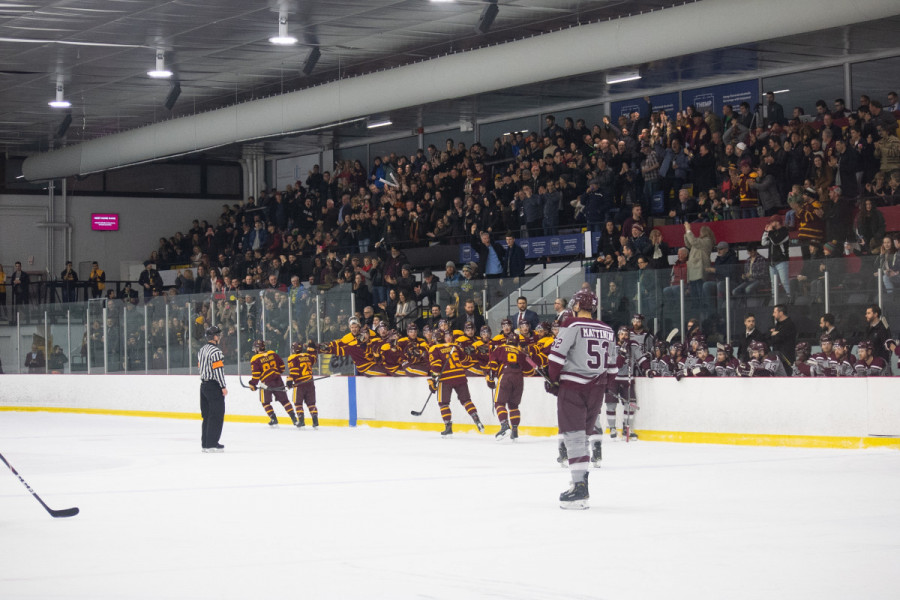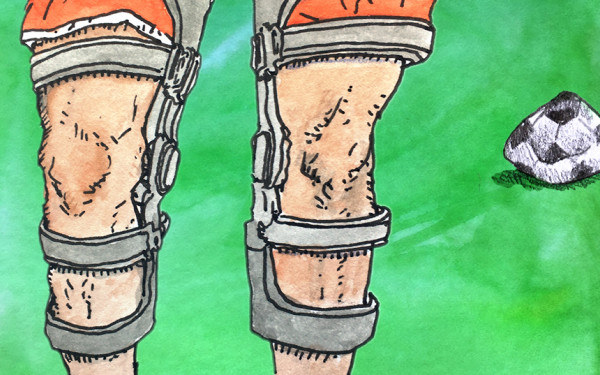The world of sports is injured
Athletes struggle with void left by competition hiatus
You don’t know what you’ve got until it’s gone. I’m sure you’ve all heard that one before, haven’t you? I’m quite certain we’ve all felt it, too—but never to this extent.
Eight months ago, I wouldn’t have imagined myself sitting here writing this article as I watch the snow fall, but here I am. To say this pandemic-riddled year has been mentally draining and emotionally exhausting is an understatement.
When COVID-19 touched down in Quebec, it was difficult to imagine the road ahead; even more so, it was hard to accept. As much as we tried to convince ourselves otherwise, there was no denying the fact that this virus was more than just an overnight visitor.
For me, it was the third Monday in March when reality started settling in. I was supposed to be in school that day, but I wasn’t. Instead, I was watching a lecture via Zoom from the comfort of my own home. Three days prior, on March 13, I was woken to the sound of my phone buzzing. It was my friend calling to tell me that schools were closing for two weeks. Talk about a wakeup call.
Today, opening my laptop to attend class is second nature, but in March I couldn’t wrap my head around what was happening. I felt like I was in a dream. Little did I know, however, that dream would turn into a nightmare—a long, long nightmare.
The power of sport—or lack thereof
A life without sports was never in the cards for me.. I never wanted to imagine it. This year, however, I didn’t have to imagine. I’m living it. Plain and simple, it sucks. In times of distress, I’ve always been able to turn to sports for comfort, but for the better part of 2020, that sense of relief has been taken from me. Golf became my saving grace this summer, but a year without soccer or hockey—for reasons unrelated to injury—was frustrating.
I miss the sweet taste of victory and the secretly satisfying feeling of revenge. I even miss the bumps and bruises. These are the simple pleasures that fuel the fire for athletes. But when there’s no wood left to burn, all that remains are ashes; that’s what these small satisfactions appear as this year—remnants in a wild spreading pandemic that’s set the world into pandemonium.
As a mental performance consultant with the Canadian Sports Psychology Association, Lior Doron has watched all the action unfold from his office. The Concordia graduate works closely with athletes to improve their mental skills and he says the numbers have “skyrocketed” since the beginning of the pandemic.
“Business is booming in that regard, for all the wrong reasons,” said Doron.
When considering athletes, think about their daily routine. In season, an athlete’s day mirrors the next, so much so that it becomes an unconscious structural routine. Humans are creatures of habit and when those routines are disturbed, they become vulnerable to emotional harm. Athletes are no exception, and this pandemic has exemplified that.
“It’s like taking away food,” said Doron. “Athletes in general need [sports]. It’s not something that they can do, it’s not something they should do, it’s something that they must do.”
In sports, the physical aspects are obvious, but that only serves as half of the battle. The other half belongs to the brain and the mental adversity that athletes face. Under all the equipment stands a competitor, but more importantly, a human; someone that has feelings and emotions just like the rest of us. Sometimes that perspective is neglected, oftentimes by the athletes themselves.
“Athletes in general need [sports]. It’s not something that they can do, it’s not something they should do, it’s something that they must do.” – Lior Doron
Admitting to suffering from mental illness isn’t easy. When you add certain constraints to that, it becomes even harder and that’s what so many of these people deal with. Growing up, athletes develop a sense of pride and toughness, and from a young age there’s pressure on them to refrain from weakness. It happens everywhere and it’s unfortunate because the more they grow, the more mental health becomes a factor, yet it’s something they were taught to ignore.
“People have sought help, although it’s still a myth, it’s still not the ‘cool’ thing to do,” said Doron. “The reality is, in my profession, we often work with people who are good that want to become better and those that are better, and they want to become the best.”
No one should ever feel held back from seeking help and in this year especially, a certain degree of emphasis can be added to that thought. Come a point in time, the turmoil begins to wear on you. The suspension of sports, the closure of gyms, the lockdowns, the league ‘bubbles,’ they’re all so taxing and sooner or later, your mental health starts feeling the effects.
“It creates more anxiety, it creates more doubt, and it lowers people’s confidence,” said Doron. “It affects what I like to look at the most–mental toughness. […] As they say in economics, ‘the rich get richer and the poor get poorer.’ Those that were built tough to last can endure this, they can look at this as a challenge, and others unfortunately crumble in this scenario.”
When we return to normality, these athletes’ performances will speak for themselves. Of course, they will vary from person to person. Some will be able to rebound, others maybe not. Regardless, when the time comes, sports fans and society as a whole must remember how this pandemic can affect an individual’s mental health which subsequently can impact their athletic performance.
Frankly speaking, yes, sports are ‘just a game.’ At the end of the day, the result won’t change the world, but it goes so much further than just the winner and the loser. For athletes, it’s a way of life, it’s what drives them to be who they are. So, when the lights shine again over Concordia Stadium and when the doors open at Ed Meagher Arena, I urge Stinger athletes to take a moment to appreciate what lies in front of them, because sometimes, you truly don’t know what you have until it’s gone.




_600_375_90_s_c1.jpg)


